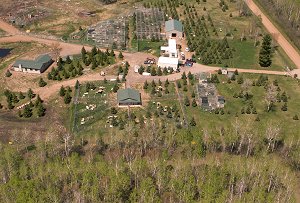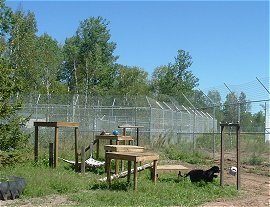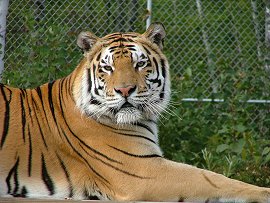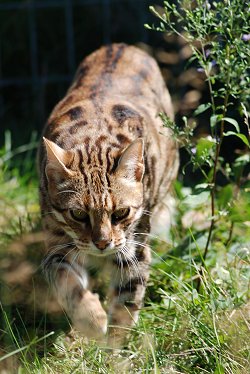The Wildcat Sanctuary

Tammy Quist, director, on the work and goals of The Wildcat Sanctuary in Minnesota in America:
"The Humane Society of the United States estimates there are as many as 10,000 large wildcats in private ownership across the USA. Ron Tilson, Conservation Director for the Minnesota Zoo, states unequivocally that there are more tigers in backyards across the United States than in all of the zoos put together.
Hundreds, or even thousands, of exotic cats and hybrids are sold to roadside zoos and to individuals as pets. A surprising number of people buy these wild animals as cubs and kittens, without understanding the difficulties of providing proper care and housing as these wild cats mature into adults. The results can be tragic for the owner, the public and the animal. The exotic pet trade causes more suffering for big cats than poaching and loss of habitat combined.
Legislators are starting to put an end to this outrage. Slowly but surely laws are being passed that prohibit the buying and selling of dangerous wild cats as pets. Minnesota passed such a law in 2004. Since then, lions, tigers, cougars, lynx, and a variety of other wild cat species are being confiscated at a furious pace. Zoos understandably decline to take in these animals; and being bred in captivity, the cats can never be released into the wild.
The Wildcat Sanctuary provides a safe solution for the public, and a humane alternative to killing the cats. (TWS) is a 501(c)3 non-profit, no-kill rescue facility, located in Sandstone, Minnesota. It provides for the humane rescue and sheltering of unwanted, mistreated, and neglected privately-owned wildcats that pose a risk to public safety. TWS is committed to public education about the captive wildlife crisis; offering training opportunities for veterinarians; and supporting legislative solutions to the public safety issues created by the private ownership of wild animals.

At TWS, animals are never bought, sold, bred, traded, or mistreated in anyway. Each resident is there for life, and is given every opportunity to behave naturally in a wonderfully humane environment. The Sanctuary is accredited by The Association of Sanctuaries and the American Sanctuary Association. This means that TWS meets strict care and safety standards, and is the only accredited big cat sanctuary in the American Upper Midwest. The vision and need for The Wildcat Sanctuary has garnered endorsements from the Minnesota Zoo and the University of Minnesota's Veterinary Care Program.
TWS has earned a national reputation for excellence in rescuing and housing captive wildcats while providing a unique service to animal control officers, local sheriff departments, humane societies and also the US Department of Natural Resources and the US Fish & Wildlife Service.
Our goals are to:

- Provide a safe solution for the public and a humane alternative for the animals.
- Provide free-roaming and natural habitats to the animals in our care.
- Minimize the number of dangerous wild animals kept as pets through education, legislation and rescue.
- Provide a sanctuary in Minnesota that can provide more services to the state and surrounding areas through increased capacity, an education centre and training opportunities for future veterinarians who will work with larger animals.

At TWS, we put the animals' best interests first, remembering that they are the reason why we are here. All of the cats have spacious enclosures with room to run and play. Their environment is enriched with items such as perches for climbing and toys for stimulation. The cats are fed fresh meat on a daily basis. They are vaccinated annually and provided with on-site veterinary care. But their care is expensive. Each enclosure costs $7,000 - $25,000 to build. A temperature-controlled den is $520. TWS' winter electricity bill is over $1,000 per month. And a tiger eats 15 pounds a meat a day - which adds up over time.
As well as the lions, tigers and cougars which we take in, the Sanctuary is also home to dozens of hybrid cats including Bengals, Chausies and Savannahs. This new wave of 'lap leopards' has caused a corresponding wave of homeless pets. Even though these hybrids are usually not much larger than a house cat, they do not always display domestic qualities. Many have poor litter box habits, and some have bitten owners or killed other domestic pets. Many states and cities outlaw all generation of hymbrid cats - something breeders may neglect to tell buyers until it is too late.
In taking any animal into the household, it is the human's responsibility to research the needs of the breed/species and make sure it is suitable, rather than buying an animal simply because it is beautiful or unique. The idea of a wild or hybrid cat is much more glamorous in theory than reality. To think a wild animal or hybrid will show only domestic qualitis is both ignorant and selfish, and in any case, there are so many wonderful domestic animals that need our help and can give us the companionship we desire. For this reason our Sanctuary spends much of its time advocating and supporting domestic rescues. Our motto is 'Keep the wild in your heart, not in your home'.
More information on The Wildcat Sanctuary can be found at: http://wildcatsanctuary.org/."

